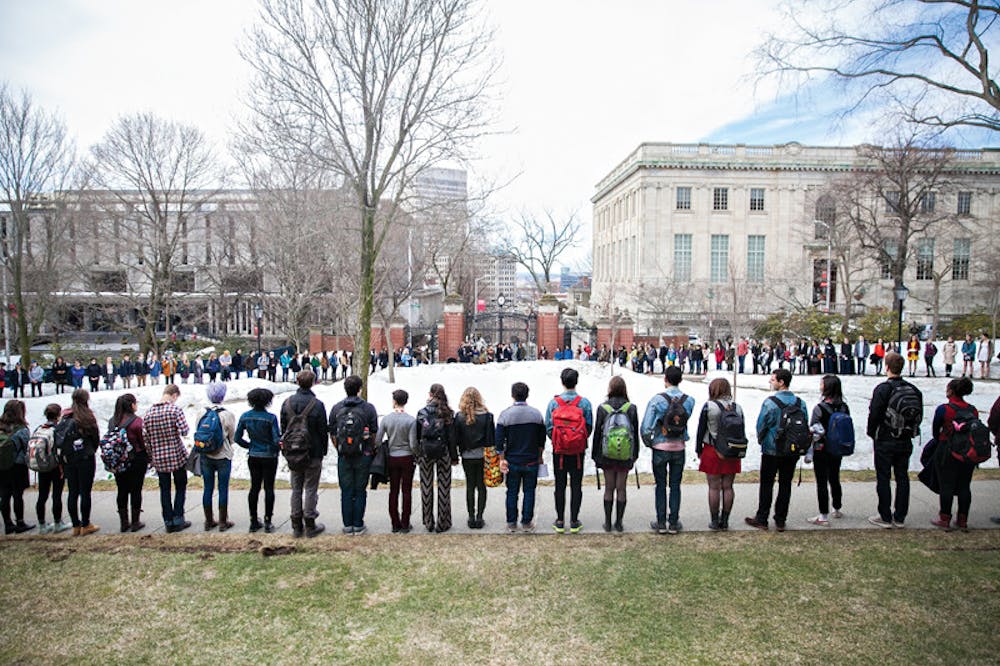About 400 community members marched silently from Wriston Quadrangle, through University Hall and onto the Quiet Green Wednesday to protest the University’s handling of the widely discussed date-rape drug and sexual assault cases.
Demonstrators gathered in front of the Sharpe Refectory just before noon to trade in regular dollar bills for ones taped with the bright-red numerals “IX” in reference to Title IX. The protesters placed the marked bills over their mouths — an image that has become the de facto symbol of Act4RJ, the student movement that organized the event.
The crowd packed the space between Sears and Marcy Houses — the latter of which houses the fraternities Alpha Epsilon Pi and Zeta Delta Xi — where residents stood on porches and looked on. Sears House, formerly the home of Phi Kappa Psi — the fraternity sanctioned for hosting the October party at which two female students were allegedly served a drink spiked with GHB — flew the historical American flag that depicts an image of a rattlesnake alongside the words, “Don’t tread on me.”
As protesters taped the dollar bills over their mouths, event organizers distributed a leaflet that explained the purpose of the protest and contained instructions for participants. Protesters were asked to remain silent throughout the event. If questioned about the event, they were instructed to show the explanation on the leaflet.
Event organizers addressed the crowd by megaphone, reading a list of the two complainants’ grievances, along with a list of 10 demands the organizers and the two women collectively drafted. The organizers criticized the cancellation of a hearing for the student accused of administering GHB and the reasoning behind the finding of not responsible for the student accused of sexual assault.
The protest leaders expressed their intention to deliver the demands directly to the administration, noting the two women’s desire that all actions be directed at the University’s handling of the case instead of the alleged perpetrators.
“As a result of her incapacitation and memory loss from the date-rape drug, the survivor, due to her incomplete memory, could not provide a narrative to counter that of her assailant,” Katie Byron ’15, an organizer and a member of the Task Force on Sexual Assault, read from a prepared statement.
“Using the logic of the panel, to find justice, she needed to consume enough of the date-rape drug to both show and remember showing obvious symptoms of incapacitation,” Byron said, adding, “So no blacking out allowed.”
Byron said the hearing’s resulting reliance on the accused student’s account “contradicts the notion that consent is an action, not a perception.”
The procession was led by several event organizers and a pair of individuals carrying an unadorned mattress, reminiscent of Emma Sulkowicz’s protest at Columbia.
Maahika Srinivasan ’15, president of the Undergraduate Council of Students, held open the University Hall door as protesters filed in, past the offices of the president and the provost and out onto the Quiet Green.
Inside University Hall, event organizers taped the list of demands to Assistant to the President Kimberly Roskiewicz’s door, Byron told The Herald. Roskiewicz said she and other University Hall staff members were aware the protest would take place.
The protesters formed a circle on the Quiet Green, where organizers, assembled in front of the Van Wickle Gates, thanked them for their participation in the 45-minute event.
“This is a community that demands responsibility,” Byron said to a chorus of snaps.
Raizella Berman ’18 said she attended “in solidarity with survivors of sexual assault, and to protest (the) University’s mishandling of the issue.” Berman added that she was equally frustrated by the possibility that the Corporation ties of the student accused of spiking the drink influenced the hearing’s cancellation and by the outcome of the sexual assault hearing.
Charlotte Biren ’16 said the large turnout for the protest was important in encouraging the University to be transparent, especially in light of information released after a long period of confusion surrounding the case’s facts.
Emma Storbeck ’17 said she appreciated a large community showing to emphasize solidarity with the complainants, as opposed to malice toward the accused.
Organizer Jeanette Sternberg Lamb ’15 said she, the complainants and the other organizers were pleasantly surprised by the large turnout. While she characterized the event as a success, she added that it is too early to anticipate future actions by Act4RJ before the administration responds.
“I’ve been wanting to help stand in solidarity for a while,” Srinivasan said, adding that she has been working with the complainants to help effect institutional change.
Srinivasan said she can act as a bridge between concerned students and the administration.
“This protest was symbolically a way for students to ask for accountability from the University, and my being at the door was just kind of a symbolic offering that students should feel that they can ask for that and that I will help fulfill that in any way, shape or form that I can,” she said.
Though Srinivasan said it is too early to predict the administrative response, “they’re working to the best of their ability to respond to this situation in the parameters that they are limited to … especially when it comes to Title IX,” she said.





